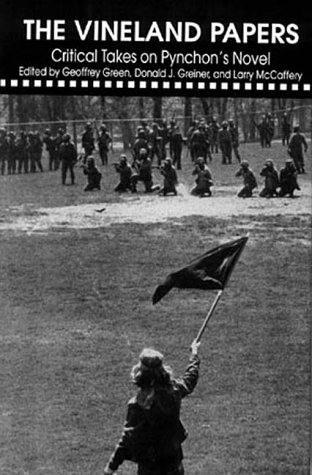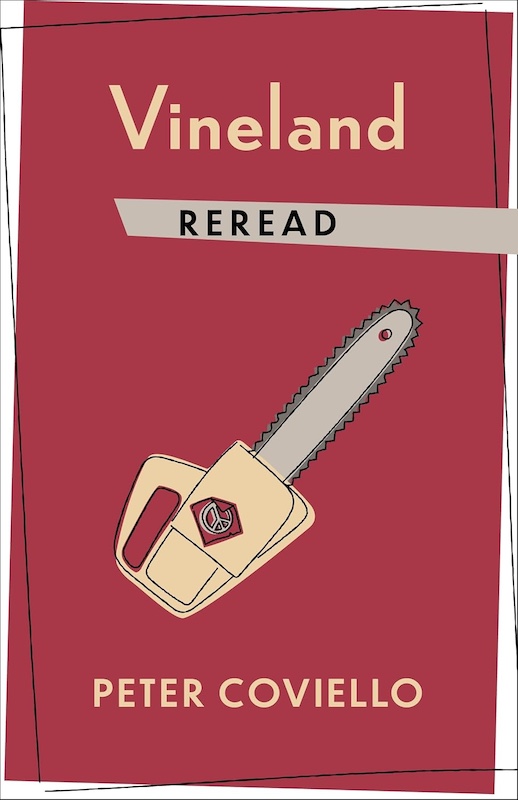Pynchon Criticism: Shorter Works
- At January 31, 2021
- By Spermatikos Logos
- In Pynchon, The Modern Word
 0
0
And then maybe some playful soul shows up with a bucketful of piranhas, dumps them in the pool, and right away they can taste the blood. They swim around looking for what’s bleeding, but they don’t find anything, all of them getting more and more crazy, till the craziness reaches a point. Which is when they begin to feed on each other.
—“Inherent Vice”
Pynchon Criticism: Vineland, Inherent Vice, Bleeding Edge
This page collects essays, analysis, and guides centering on Pynchon’s shorter, more accessible novels: Vineland (1990), Inherent Vice (2009), and Bleeding Edge (2013). Most of the books profiled in this section are accompanied by a brief description, a summary of contents, and the official publisher’s blurb. If any visitor would like to contribute informed commentary for any of these works, please contact Spermatikos Logos! The books are listed in chronological order of publication. Clicking the image of a book takes you directly to Amazon.
The Vineland Papers
Dalkey Archive Press, 1993.
Publisher’s Description: The publication of Thomas Pynchon’s novel Vineland in 1990, 17 years after his epochal Gravity’s Rainbow, received unprecedented attention from the media and tens of thousands of readers, all wondering why the novel was so long in the making and whether it would be as momentous as his last novel. The Vineland Papers is the first book-length study of Pynchon’s problematic new novel: a dozen leading Pynchon critics offer their takes on the book examining it from a variety of angles: its relation to Pynchon’s previous work, its humor, its use of various technical fields, its use of history and film, its politics, its structure, and its autobiographical elements. Feminist theory is brought to bear on Pynchon’s representation of women in the novel by several of the contributors, and all of them write in an accessible manner so that the book will appeal to the general reader as well as the scholar. For many readers and scholars alike Pynchon is the single most important living novelist, and The Vineland Papers is invaluable for understanding how his fourth novel alters or confirms that reputation. The contributors include David Cowart, N. Katherine Hayles, David Porush, Elaine B. Safer, Joseph Slade, Joseph Tabbi, Susan Strehle, Stacey Olster, Molly Hite, William E. Grim, Eric Solomon, Andrew Gordon, and Clifford Mead.
Here are some words from an offsite reviewer: “A tough book to find, but when you do, it’s worth it. The essays in this collection are informative, shedding light onto such slippery aspects of the novel as style, recurring motifs, Pynchon’s humor, the novel’s narrative structure, and satirical targets. The final work in the collection is a memoir by someone who allegedly got high with the notoriously reclusive author in the late-Sixties. Much of the criticism in this collection assumes the reader is familiar with Gravity’s Rainbow as a point of reference, so if Vineland is your first go at Pynchon, many of the references in these criticisms will seem difficult understand. Overall, this is a handy book to read once you’ve finished Vineland and need to make sense of all the wackiness.”
Vineland Reread
Columbia University Press, 2021
Publisher’s Description: Vineland is hardly anyone’s favorite Thomas Pynchon novel. Marking Pynchon’s return after vanishing for nearly two decades following his epic Gravity’s Rainbow, it was initially regarded as slight, a middling curiosity. However, for Peter Coviello, the oft-overlooked Vineland opens up new ways of thinking about Pynchon’s writing and about how we read and how we live in the rough currents of history. Beginning with his early besotted encounters with Vineland, Coviello reads Pynchon’s offbeat novel of sixties insurgents stranded in the Reaganite summer of 1984 as a delirious stoner comedy that is simultaneously a work of heartsick fury and political grief: a portrait of the hard afterlives of failed revolution in a period of stifling reaction. Offering a roving meditation on the uses of criticism and the practice of friendship, the fashioning of publics and counterpublics, the sentence and the police, Coviello argues that Vineland is among the most abundant and far-sighted of late-century American excursions into novelistic possibility. Departing from visions of Pynchon as the arch-postmodernist, erudite and obscure, he discloses an author far more companionable and humane. In Pynchon’s harmonizing of joyousness and outrage, comedy and sorrow, Coviello finds a model for thinking through our catastrophic present.
The Counterforce: Thomas Pynchon’s Inherent Vice
Fiction Advocate, 2021
Publisher’s Description: Thomas Pynchon’s cult detective novel, Inherent Vice, depicts drug-addled private investigator “Doc” Sportello, a leftover of 1960s idealism, on an errant quest to decipher the disappearance of a real estate tycoon. As in his other books, Pynchon imagines a “counterforce” of marginalized dreamers and weirdos seeking a more humane world. Tracing Inherent Vice’s hilariously tangled plotlines and its hallucinatory prose, J.M. Tyree explores the clues that link a paranoiac thriller set in Nixon-era Los Angeles to toxic national myths that define America today. Tyree arranges each chapter after something Pynchon stands against—werewolves, sobriety, linear time, Hollywood—and defends the liberties taken in Paul Thomas Anderson’s film of Inherent Vice. If, as Pynchon suggests, another past is possible, then perhaps a different future is possible. A lucid guide to Pynchon’s idiosyncratic historical fiction, The Counterforce argues that facts alone cannot save us. We need better stories.
Pynchon Criticism:
[Main Page | General 1974–1999 | General 2000–Present | V. | Crying of Lot 49 | Gravity’s Rainbow | Mason & Dixon | Against the Day | Shorter Works | Contextual | Bibliography]
[Main Page | General 1974–1999 | General 2000–Present | V. | Crying of Lot 49 | Gravity’s Rainbow | Mason & Dixon | Against the Day | Shorter Works | Contextual | Bibliography]
Author: Allen B. Ruch
Last Modified: 3 September 2024
Main Pynchon Page: Spermatikos Logos
Contact:quail(at)shipwrecklibrary(dot)com
Last Modified: 3 September 2024
Main Pynchon Page: Spermatikos Logos
Contact:quail(at)shipwrecklibrary(dot)com




